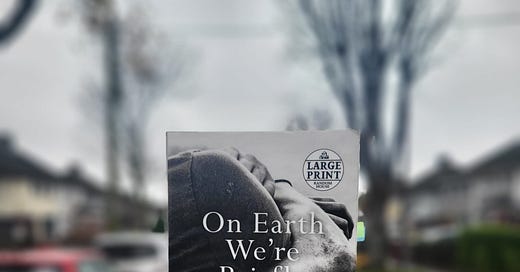On Earth We're Briefly Gorgeous: Book Review
A brief review of Ocean Vuong's 'On Earth We're Briefly Gorgeous'
“There is so much I want to tell you, Ma. I was once foolish enough to believe knowledge would clarify, but some things are so gauzed behind layers of syntax and semantics, behind days and hours, names forgotten, salvaged and shed, that simply knowing the wound exists does nothing to reveal it” - pg. 91
A common icebreaker for me is asking people what their favourite book is. And no, it is not because it tells me something deep or metaphorical about them, I just often run out of things to say, and books (once again) are there to save me. This inexplicable failure to know when to let a conversation die is how I heard of On Earth We’re Briefly Gorgeous, with two people coincidentally recommending the book to me on the same day! What were the odds?!
The novel is written as a letter from the narrator, Little Dog (yes, that’s the name), to his illiterate mother. It walks you through all that has built his life, from his family fleeing the war in Vietnam as well as how this history followed them around even when they reached a safe haven. In this letter, he recounts his experiences, from the times he detested and times he will cherish dearly, the glorious times he loved to the harrowing times he lost. Couched within this is the story of Little Dog and Trevor, two boys trying to forge a life outside of their family, who find solace, adventure, excitement and love in each other. The book is such a raw and heartwarming tale of the intricacies of a mother-and-son relationship marked by war and migration.
“You once told me that memory is a choice. But if you were god, you’d know it’s a flood”- pg. 112
The book is equally about Little Dog’s mother as it is about him. It is about how war is the elastic band that pulls them together and ferociously snaps them apart. Through Little Dog’s family, the reader experiences how invasive war is. An example of this is seen when early one morning, his mother drives to save her sister from her violent boyfriend only to realise that the sister had not been around for five years. Or the frantic panic of his grandmother when their neighbours were shooting fireworks on the eve of Independence Day. It was as if Ocean Vuong was trying to illustrate that no matter how much time passes, the past is rarely as far as we think it is.
Within the book, the author also offers a pointed exposition of the ins and outs of migrant life. He brings to the fore the hassles of living in the diaspora. The loneliness, the hopelessness, tiredness and the shattered sense of self-worth that comes with it. Describing the nature of work, Little Dog says “… there are no salaries, healthcare or contracts. The body, the only material to work with and work from”. Going on, he points out how the experiences cripple most of the initial dreams that one harbours when they move abroad, “A new migrant, within two years, will come to know that the salon is, in the end, a place where dreams become calcified knowledge of what it means to be awake in American bones”.
I loved how the narrator describes his mother. He does not villainise her for her flaws, nor does he deify her for the sacrifices she made. The letter is his journey in just understanding her. In seeing how her past and circumstances have moulded this woman. How she was only parenting the way she knew how, while navigating an absent husband, caring for her mother and living in a world whose language she only grasped through her son.
I know I often complement the writing style of different books, but this one? This is special! Almost every other sentence is a quotable. If I was ever a writer, I would want to be an unholy blend of Ocean Vuong and Caleb Nelson.
I can not wait to read more Ocean Vuong! Also, I will leave you with some of my favourite lines from the book below.
“You once told me that the human eye is god’s loneliest creation. How so much of the world passes through the pupil and still it holds nothing” - pg. 16
“I came to know, in those afternoons that madness can sometimes lead to discovery, that the mind, fractured and short-wired is not entirely wrong” - pg. 33
“If you were god you would tell them to stop clapping. You would tell them that the most useful thing one can do with empty hands is hold on. But you are not a god.” - pg. 108
“I miss you more than I remember you” - pg. 267
“I remember learning that saints were only people whose pain was notable, noted. I remember thinking you and Lan should be saints” - pg. 311




